Program
Program konferencie - prehľad
| 9:00 | Otvorenie |
| 9:30 | Pozvaná prednáška: Michal Valko - Gamification of Large Language Models |
| 10:30 | Študentské, doktorandské, postdoktorandské osobnosti |
| 10:30 | Poster session + káva: prezentácie študentov |
| 12:00 | Obedná prestávka (individuálne) |
| 13:00 | Významné výsledky z matematiky, fyziky, informatiky a didaktiky |
| 15:00 | Poster session + káva: prezentácie vedeckých výsledkov FMFI UK |
| 16:30 | Pozvaná prednáška: Jiří Šilha - Astronómia sa stretáva s priemyslom |
| 17:15 | Panel: Čo chceme od spolupráce s praxou |
| 18:00 | Káva |
| 18:30 | Koncert Vocalatté |
| 19:00 | Recepcia s bufetom, voľná diskusia |
Plenárne prezentácie – študentská sekcia (10:30–11:00)
Vahideh Ilbeigi – Detection of Plant Hormones by Ion Mobility Spectrometry
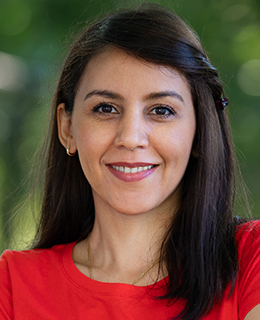
Spoluautori: Vahideh Ilbeigi, Štefan Matejčík, Ladislav Moravský
Abstrakt: Ion mobility spectrometry (IMS) is an analytical technique for the gas phase detection of ions based on their mobilities. We are working on the development of IMS-based methods for the measurement of analytes in plant and food samples. Plant hormones (PHs) are signalling molecules produced within plants that influence plant growth, seed germination, fruit maturation, and ripening. Hence, the quantitative analysis of the PHs and determination of their concentrations in different tissues is crucially important in understanding the role of these molecules in physiological processes occurring in plants. We developed an IMS-based method to measure methyl salicylate (MeSA), one of the important plant hormones, in tomato leaves. For this purpose, we utilized solid phase microextraction (SPME) to extract MeSA, followed by a pre-separation using a multicapillary column (MCC) before analyzing the sample with IMS. We have also developed an IMS-based method for the in-vivo detection of the volatile organic compounds (VOCs) emitted from the blueberry plant. A glass chamber equipped with a Tenax absorbent column was designed and constructed to collect the emitted VOCs from the blueberry plant. The complex VOCs matrix was separated using a combination of an MCC column and IMS. The developed Tenax-MCC-IMS method was used for the detection of the emitted VOCs from blueberry leaves upon exposure to different stress factors including mechanical (punching), herbivore (aphids) and methyl jasmonate (MeJA) spraying.
Bio: Vahideh Ilbeigi vyštudovala Isfahan University of Technology v Iráne, kde získala aj PhD. Na fakulte pôsobí na Katedre experimentálnej fyziky ako postdoktorandka programu MSCA Marie Curie pod vedením Štefana Matejčíka.
Jakub Krcho – Peer assessment based on rubrics in educational robotics
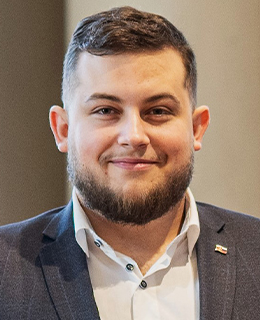
Abstrakt: Educational robotics is becoming more and more important in modern educational approaches every year. With its increasing integration into the teaching process, it is essential for teachers to set clear learning objectives and desired outcomes for students. It is equally important to choose effective assessment methods to assess the extent to which students have achieved these learning objectives (goals). In this context, student assessment plays a key role, which leads to the question of what assessment approaches are most appropriate for educational robotics. This research study examines the implementation of peer assessment through rubrics in educational robotics lessons in Slovak high schools. The research follows a design-based research methodology, and the current academic year represents the second iteration of this established assessment system in educational robotics. In this paper, we present the initial results of the research carried out under grant UK/3232/2024 - "Selected ways of assessing students in educational robotics".
Bio: Jakub Krcho je doktorandom v 3. ročníku na Katedre didaktiky matermatky, fyziky a informatiky, kde pracuje pod vedením Karolíny Mikovej.
Plenárne prezentácie – Výsledky vedy na FMFI (13:00 - 15:00)
Pavol Bokes – Feedback on dilution in stochastic gene expression: a comparative study of single-cell and population frameworks
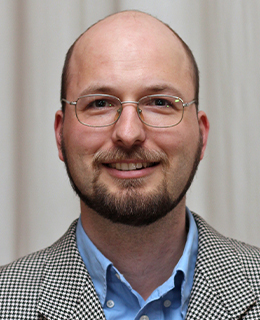
Spoluautori: Pavol Bokes, Iryna Zabaikina, Abhyudai Singh
Abstrakt: We consider a protein that negatively regulates the rate at which a cell grows. Since less growth means less protein dilution, this mechanism forms a positive feedback loop on the protein concentration. We couple the feedback model with a simple description of the cell cycle, in which a division event is triggered when the cell volume reaches a critical threshold. Following the division we either track only one of the daughter cells (single cell framework) or both cells (population framework). We use the piecewise deterministic Markov process to model a single cell; the population is formalised using the measure-valued Markov process, ie, the population is treated as a sequence of Markov processes. For both frameworks, we find an exact stationary joint distribution of protein concentration and cell volume.
Bio: Pavol Bokes je absolvetom magisterského štúdia na našej fakulte. PhD získal na University of Nottingham v Spojenom Kráľovstve. Od svojho návratu na fakultu pôsobí na Katedre aplikovanej matematiky a štatistiky.
František Herman – Dynes Superconductors and Beyond
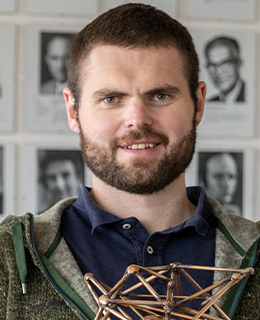
Spoluautori: František Herman, Richard Hlubina, Lucia Gelenekyová, Marcel Polák, Anastasiya Lebedeva, Matúš Hladký
Abstrakt: One of the research branches within the Department of Experimental Physics at our faculty is dedicated to the theory of superconducting phenomena. I will try my best to introduce the topics of our concern, as well as to explain our motivation for focusing on them. What did we do, and what are the open questions? What else is actually happening in the Condensed Matter Physics section (shortly), and who are the amazing people behind its activities?
Bio: Je absolventom našej fakulty, kde získal aj PhD. Po skončení štúdia bol postdoktorandom na ETH Zürich vo Švajčiarsku. Neskôr sa vrátil na fakultu, kde pôsobí na Katedre experimentálnej fyziky. V roku 2024 získal Eset Science Award v kategórii Výnimočná osobnosť vedy do 35 rokov. František je členom projektu SASPRO2 financovaného mechanizmom HORIZONT 2020 Marie Skłodowska-Curie č. 945478.
Igor Farkaš – Dark side of modern AI: adversarial vulnerability of trained neural networks
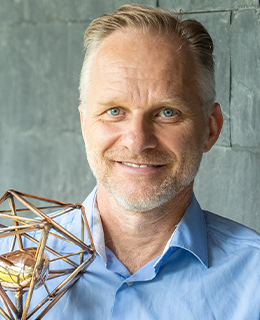
Abstrakt: Modern artificial intelligence based on deep neural networks has demonstrated in the past decade great achievements in concrete tasks, sometimes even surpassing human performance. On the other hand, there exist fundamental problems in these models, be it image classification or natural language tasks. In the talk, we mention the underlying problems and focus on the case of adversarial examples that can easily fool trained neural network classifiers, hence revealing their lack of robustness. We provide a few examples from our research that shed light on the underlying processes.
Bio: Igor Farkaš vyštudoval FEI STU, kde získal aj doktorát z aplikovanej informatiky. Pôsobil ako postdoc na University of Richmond, Virgínia, USA. Na fakulte pôsobí od roku 2003. Je dlhoročným garantom medzinárodného programu Kognitívna veda. Pôsobil aj ako vedúci Katedry aplikovanej informatiky. V súčasnosti je zodpovedným riešiteľom Horizon Europe projektu TERAIS. V roku 2023 sa stal vedcom roka v kategórii Osobnosť medzinárodnej spolupráce. V roku 2024 získal cenu Eset Science Award v kategórii Výnimočná osobnosť vysokoškolského vzdelávania.
Mária Slavíčková – Research in mathematics education: challenges and impact
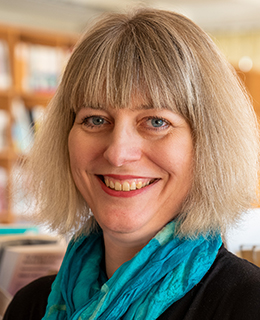
Abstrakt: In this presentation, key outcomes from research conducted by the Department of Mathematics Education over the past few years will be summarized. Special focus will be given to the results from the H2020 project MaTeK and the ongoing research building upon it. Insights and findings from other projects in which the department has been or is currently involved will also be shared.
Bio: Mária Slavíčková je vedúcou Oddelenia didaktiky matematiky na Fakulte matematiky, fyziky a informatiky Univerzity Komenského v Bratislave. Vo svojej pedagogickej praxi sa zameriava na prípravu budúcich učiteľov matematiky pre druhý stupeň ZŠ a stredné školy. Jej výskum je orientovaný na zmysluplné využívanie digitálnych technológií a podporu argumentácie a dôvodenia v matematike. Bola zodpovednou riešiteľkou Horizon 2020 projektu MaTeK, ako aj ďalších domácich projektov.
Panelová diskusia venovaná spolupráci s praxou (17:15–18:00)
Bližšie informácie čoskoro
Koncert Vocalatté (18:30)
Hudobným hosťom MatFyz CONNECTIONS bude vokálna skupina Vocalatté, ktorej mnohí členovia sú študentmi a absolventmi našej fakulty. Skupina sa stretáva a skúša v priestoroch FMFI UK.
Po koncerte bude občerstvenie a možnosť zotrvať v diskusiách a rozhovoroch s kolegami, študentami a hosťami.

